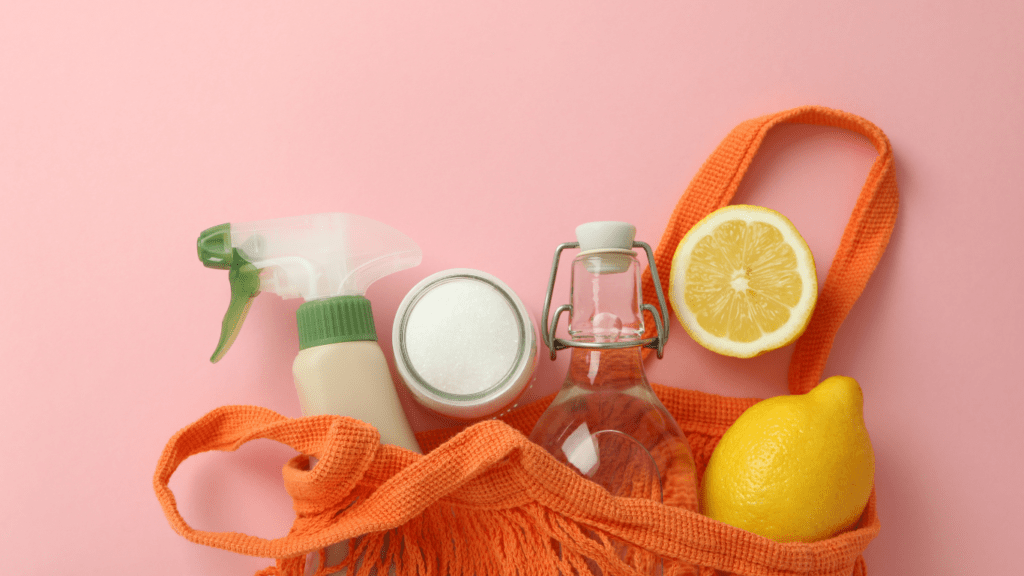What Are Natural Cleaning Products?
Natural cleaning products contain ingredients derived from nature. They aim to provide an eco-friendly alternative to traditional chemical cleaners.
Defining Natural Ingredients
Natural ingredients are sourced from plants, minerals, and other naturally occurring substances. They are minimally processed to retain their natural properties. Typical natural ingredients exclude synthetic chemicals, artificial fragrances, and harmful preservatives.
Common Natural Ingredients and Their Uses
Natural cleaners often include:
- Vinegar: Effective for disinfecting and removing odors.
- Baking soda: Excellent for scrubbing and neutralizing acids.
- Lemon juice: Useful for its antibacterial properties and fresh scent.
- Castile soap: Versatile for general cleaning, including surfaces and dishes.
- Essential oils (e.g., tea tree, lavender): Provide antimicrobial effects and pleasant aromas.
These ingredients clean efficiently while minimizing environmental impacts and reducing exposure to harmful substances.
Evaluating the Effectiveness of Natural Cleaning Products
Natural cleaning products claim to be both effective and eco-friendly. Let’s see how they stack up compared to chemical cleaners.
Performance Compared to Chemical Cleaners
Natural cleaning products often use ingredients like vinegar, baking soda, and essential oils to achieve cleaning results. Studies have shown that vinegar can effectively eliminate bacteria due to its acetic acid content.
Baking soda offers abrasive qualities that help scrub surfaces clean without causing damage. Essential oils, like tea tree and lavender, possess antimicrobial properties, adding an extra layer of sanitation.
Traditional chemical cleaners sometimes outperform natural options for severe stains and grime, often containing strong surfactants and disinfectants. However, these can leave behind toxic residues and contribute to indoor air pollution.
Natural products excel in routine cleaning and maintaining a healthier indoor environment. They also significantly reduce risks associated with exposure to hazardous chemicals.
Case Studies and Consumer Reports
Several case studies have evaluated the effectiveness of natural cleaning products. One study found that a mix of vinegar and water removed 99% of bacteria on kitchen surfaces.
Another highlighted a formulation of baking soda and lemon juice effectively cleaned bathroom tiles and grout. Consumers, too, often report satisfaction; a 2020 survey showed that 70% of users found natural products effective for everyday cleaning tasks.
Consumer Reports has tested various natural cleaners against their chemical counterparts. While some natural products like castile soap scored slightly lower on tough, greasy messes, they performed comparably on general surface cleaning.
Feedback often emphasized the absence of harsh chemical odors and residual irritation, making them preferable for families and individuals sensitive to conventional cleaner fumes.
By synthesizing study data and real user experiences, it’s evident that natural cleaning products can be both efficient and preferable for those prioritizing health and environmental sustainability.
Benefits of Using Natural Cleaning Products

Natural cleaning products offer several compelling benefits. These advantages make them a preferred choice for eco-conscious individuals and those seeking healthier alternatives.
Environmental Impact
Natural cleaning products significantly reduce the environmental footprint. Unlike traditional cleaners that contain synthetic chemicals, natural options use biodegradable ingredients.
This minimizes pollution in waterways and soil. For instance, ingredients like vinegar and baking soda break down quickly and don’t persist in the environment.
Additionally, many natural cleaning products come in recyclable or minimal packaging, further reducing waste. Switching to natural cleaners supports sustainability by minimizing chemical runoff and reducing the volume of non-biodegradable materials.
Health and Safety Benefits
- Natural cleaning products contribute to a healthier indoor environment.
- Traditional cleaners often release volatile organic compounds (VOCs), which can cause respiratory issues and skin irritation.
- In contrast, natural products utilize gentle ingredients like essential oils and castile soap that don’t pose these risks.
- Numerous studies have linked chemical cleaning sprays to asthma and other respiratory problems, underscoring the health benefits of natural alternatives.
- Users report fewer allergic reactions and less skin irritation when using natural products.
- As a result, households with children, pets, or individuals with sensitivities find natural cleaners to be a safer and more comfortable choice.
Challenges and Limitations
Natural cleaning products face specific challenges despite their benefits. Understanding these helps make informed choices.
Effectiveness on Tough Stains
Natural cleaners often struggle with tough stains. Chemical cleaners have powerful agents to tackle grease, mold, and deeply ingrained dirt.
For example, hydrogen peroxide and ammonia in chemical solutions quickly break down stains, while natural options like baking soda and vinegar may require more effort and time.
Using natural products on less severe stains, then introducing occasional chemical cleaners for stubborn areas, strikes a balance.
Cost Comparison and Availability
Natural cleaning products can be more expensive and less readily available compared to their chemical counterparts. While ingredients like vinegar and baking soda are affordable, commercial natural cleaners often come at a premium due to their eco-friendly packaging and sustainable sourcing.
Availability varies by region; larger urban areas may have more options in stores, while rural areas might rely on online shopping. Choosing raw ingredients for DIY solutions can mitigate some costs but may require more time and effort.
 Heather Smithkers - Innovative Eco-Author at Green Commerce Haven
Heather Smithkers is a creative and forward-thinking author at Green Commerce Haven, where she brings a unique perspective to the world of sustainability. With a flair for storytelling and a deep commitment to environmental advocacy, Heather crafts engaging content that resonates with eco-conscious readers. Her work delves into the latest trends in green startups, organic products, and sustainable living, offering fresh insights and practical advice. Heather’s innovative approach to writing helps demystify complex environmental topics, making them accessible and inspiring to a broad audience.
Heather Smithkers - Innovative Eco-Author at Green Commerce Haven
Heather Smithkers is a creative and forward-thinking author at Green Commerce Haven, where she brings a unique perspective to the world of sustainability. With a flair for storytelling and a deep commitment to environmental advocacy, Heather crafts engaging content that resonates with eco-conscious readers. Her work delves into the latest trends in green startups, organic products, and sustainable living, offering fresh insights and practical advice. Heather’s innovative approach to writing helps demystify complex environmental topics, making them accessible and inspiring to a broad audience.
